Swimming classes for children with autism provide essential water safety skills in supportive environments tailored to sensory needs. You’ll find programs offering one-on-one instruction, small group settings, and family-inclusive options that focus on building confidence at individual paces. Trained instructors use visual aids, consistent routines, and positive reinforcement to establish trust. These specialized classes do more than teach swimming—they enhance motor skills, communication abilities, and social interaction through engaging aquatic therapy.
10 Swimming Classes For Children With Autism
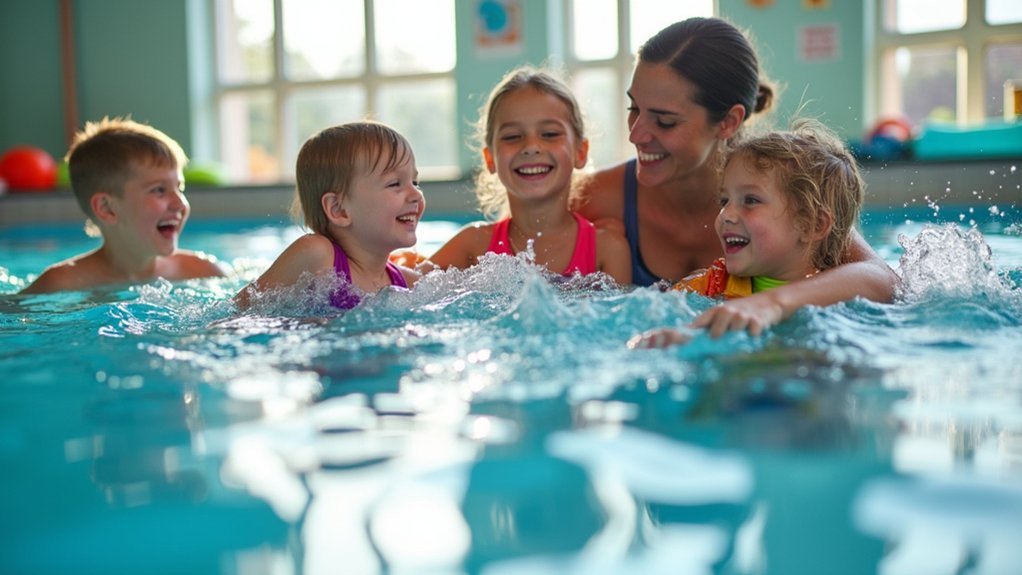
While many children enjoy splashing in pools, swimming classes for children with autism serve a far more vital purpose. With drowning being the leading cause of death among individuals with autism, these specialized lessons provide essential water safety skills that can save lives.
Programs like Texas Swim Academy’s Adaptive Aquatics offer individualized instruction that adapts to each child’s unique learning style. Specialized swim instructors create a supportive environment where your child can gradually build confidence in the water.
You’ll notice improvements beyond swimming abilities – many parents report enhanced communication and coordination after consistent lessons. The calm, structured setting helps children process sensory information while learning vital drowning prevention techniques.
Swimming lessons for autistic children develop more than water safety—they nurture communication and sensory processing in a structured, supportive environment.
These classes transform a potential danger into an opportunity for growth, therapy, and life-saving skill development.
Adaptive Aquatics Programs That Build Water Confidence
Adaptive aquatics programs create sensory-friendly environments with controlled lighting, temperature, and minimal distractions to help your child feel comfortable in the water.
You’ll notice instructors take time to establish trust through consistent routines and positive reinforcement, adapting their approach to your child’s specific needs.
This patient, individualized connection allows your child to develop water confidence at their own pace while learning essential safety skills.
Sensory-Friendly Learning Environments
Creating a sensory-friendly environment stands at the core of effective Adaptive Aquatics programs like those at Texas Swim Academy. When your child with autism enters these specialized settings, they’ll encounter carefully designed spaces that minimize overwhelming stimuli while maximizing comfort and security.
You’ll notice how individualized attention transforms your child’s water confidence, as instructors trained in adaptive swim instruction tailor their approach to your child’s unique sensory preferences. The supportive environment allows children to develop essential swimming skills at their own pace, reducing anxiety that might occur in traditional classes.
The calming atmosphere does more than teach water safety—it promotes emotional well-being. Children like Grayson demonstrate significant improvements not just in swimming abilities but also in communication skills, showing how these thoughtfully constructed sensory-friendly learning environments benefit multiple developmental areas simultaneously.
Instructor-Student Trust Building
Building strong relationships between instructors and children forms the foundation of successful adaptive aquatics programs for autism.
You’ll notice these programs emphasize individualized attention, creating essential trust between instructors and your child. This trust directly contributes to developing water confidence in previously hesitant swimmers.
Trained instructors communicate effectively with autistic children, adapting their teaching methods to address unique learning needs and increase comfort in the water.
The supportive environment encourages your child to trust their abilities, leading to improved swimming skills over time. Parents consistently report significant gains in their children’s confidence after participating in adaptive aquatics programs.
Celebrating small milestones during lessons reinforces motivation and strengthens instructor-student relationships.
These moments of recognition help your child build self-confidence that extends beyond the pool.
Sensory-Friendly Swimming Environments in Houston
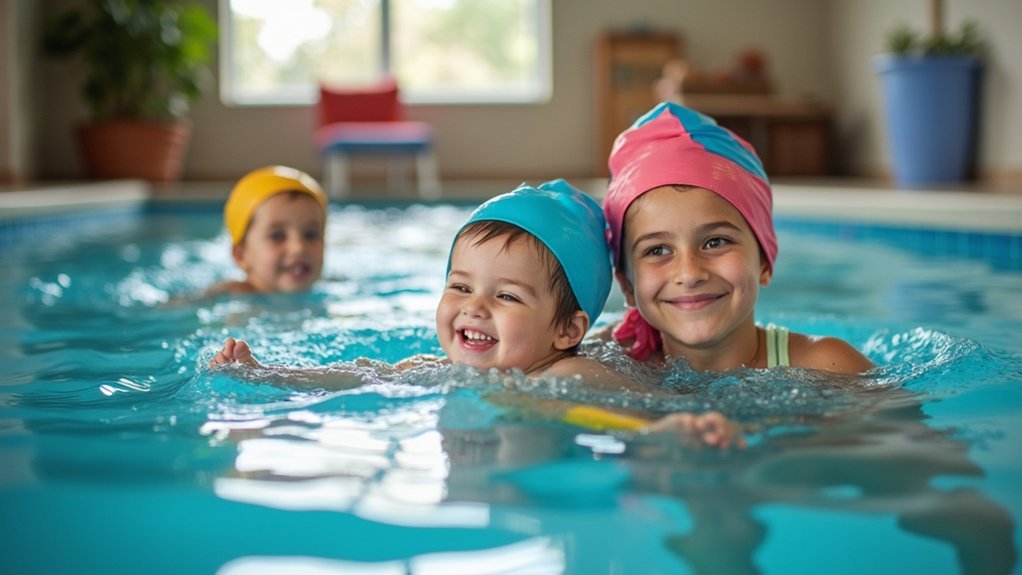
Houston’s sensory-friendly swim environments feature minimal poolside distractions, allowing your child with autism to focus without overwhelming stimulation.
Instructors at places like Texas Swim Academy use specialized techniques including visual schedules and consistent routines to help your child feel secure in the water.
You’ll notice these calm, structured settings create an ideal learning atmosphere where your child can develop swimming skills at their own comfortable pace.
Minimal Poolside Distractions
While many children thrive in traditional swim lessons, children with autism often need specially designed environments to succeed in learning water skills.
When you’re looking for swimming classes for your child with autism, you’ll find Houston swim schools like Texas Swim Academy and Sunsational Swim School have intentionally created spaces with minimal distractions.
These thoughtfully designed environments feature quieter pool areas, reduced visual stimuli, and calming colors that help your child focus on developing essential water safety skills.
Instructors trained in special needs education use gentle guidance techniques that foster confidence through individualized attention.
Your child will benefit from the calm communication approaches used in these settings, making learning more effective and enjoyable.
Specialized Instructor Techniques
Trained swim instructors at Houston’s autism-friendly swim schools employ distinctive teaching methods that transform traditional swimming lessons into sensory-supportive experiences.
You’ll notice these specialists create a calming environment by reducing noise, using visual supports, and introducing water gradually to accommodate your child’s unique sensory profile.
When selecting a program, look for instructors trained in specialized communication strategies for children on the autism spectrum. Schools like Texas Swim Academy design individualized lesson plans that address your child’s specific needs rather than following a standardized curriculum.
This personalized approach builds emotional connections between instructor and student.
The most effective programs incorporate consistent positive reinforcement, celebrating each achievement to build your child’s confidence in swimming.
These techniques create a supportive atmosphere where autistic children can develop essential water safety skills at their own pace.
One-on-One Therapeutic Swimming Lessons
Because each child with autism has unique needs and sensitivities, one-on-one therapeutic swimming lessons offer an ideal learning environment for developing essential water skills. Your child receives individualized attention from instructors trained in autism-specific communication strategies, ensuring lessons adapt to their particular abilities and comfort level.
These personalized sessions prioritize water safety skills and drowning prevention—crucial protections for children with autism who face higher drowning risks. In a calm environment free from overwhelming distractions, your child can build swimming proficiency at their own pace.
Beyond technical skills, these lessons foster a meaningful emotional connection between your child and their instructor, creating trust that enhances learning outcomes. Many parents report that these therapeutic sessions also support improvements in speech and cognitive functioning alongside water confidence.
Group Swimming Classes With Special Needs Support
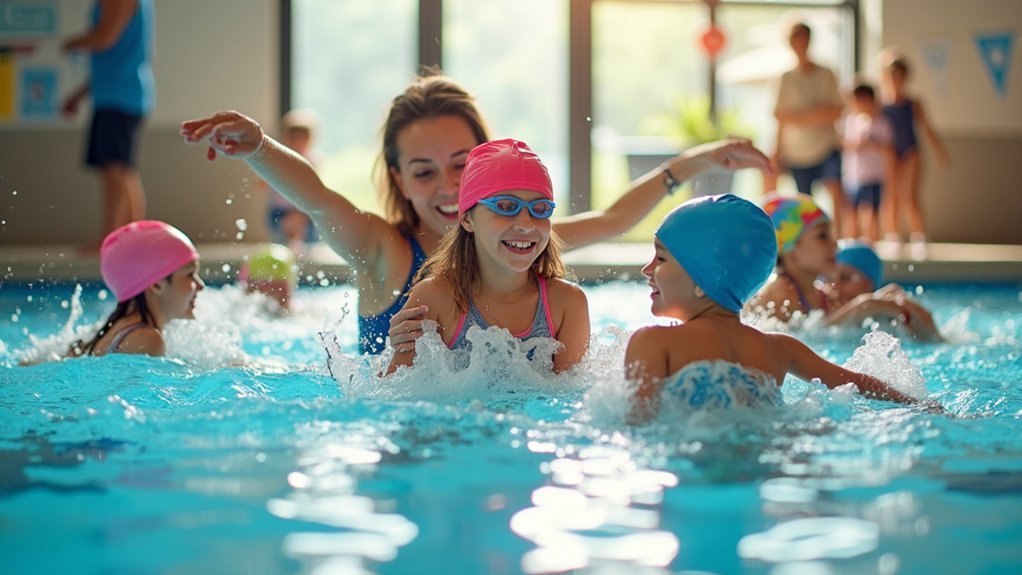
Although one-on-one lessons provide intensive support, group swimming classes with special needs accommodations offer a balanced approach that combines individualized attention with valuable peer interaction.
You’ll find these classes create a supportive environment where your child with autism learns water safety skills at their own pace.
Instructors are specially trained to adapt their teaching methods to match your child’s unique needs, ensuring effective communication throughout each lesson.
Schools like Texas Swim Academy emphasize individualized attention within the group setting, helping children overcome fears while building confidence.
Beyond swimming skills, these group classes encourage social interaction and communication among peers—providing additional developmental benefits.
Parents consistently report improvements in their children’s physical and emotional well-being through regular participation in these structured aquatic activities.
Water Safety Skills Tailored for Autistic Children
Water safety skills take on heightened importance for children with autism, especially since drowning remains their leading cause of accidental death.
When your child joins specialized swimming lessons, they’ll learn vital survival techniques like floating, treading water, and safely exiting pools or natural bodies of water.
Instructors experienced with autistic children create a supportive environment that adapts to your child’s unique communication needs.
They’ll use a calm, reassuring teaching approach that allows your child to build confidence while developing essential water safety awareness.
These tailored programs recognize that many autistic children are naturally drawn to water, making these skills particularly significant.
The foundation established in these lessons goes beyond basic swimming—it provides your child with potentially life-saving skills while respecting their individual learning pace.
Swimming Programs That Enhance Motor Development
While learning to stay safe in water, your child with autism will simultaneously develop essential motor skills through specialized swimming programs.
These classes offer individualized lesson plans focusing on coordination and body awareness through engaging water activities.
Personalized lessons adapt to your child’s unique needs, transforming water play into powerful coordination-building exercises.
You’ll notice improvements in your child’s proprioception as they become more aware of their body’s position during swimming exercises. Regular participation strengthens muscles and builds endurance, contributing greatly to overall physical development.
The aquatic environment provides a unique sensory experience that naturally encourages fine and gross motor skill development. Your child will practice various techniques in a supportive setting that accommodates their specific needs.
Many programs also incorporate therapeutic benefits beyond physical movement—the group interactions during swimming classes help children with autism develop social skills while enjoying the structured yet freeing aquatic environment.
Swim Lessons With Communication Accommodations
Swim lessons designed for children with autism feature essential communication accommodations that make water safety instruction more accessible.
You’ll find instructors trained to develop a trusting relationship with your child through individualized communication strategies tailored to their specific needs.
These specialized swim lessons incorporate techniques that enhance understanding and reduce anxiety:
- Clear, concise language paired with visual aids to improve comprehension
- Social stories and visual schedules that prepare children for what to expect during lessons
- Adaptive approaches that respect each child’s unique communication style
- Regular progress updates and open dialogue between instructors and parents
Family-Inclusive Autism Swimming Classes
Family-inclusive swim classes offer the unique advantage of allowing your child’s siblings to join in, creating a supportive network that enhances learning through familiar connections.
You’ll notice your child often feels more confident and engaged when brothers or sisters participate alongside them, reducing anxiety and creating natural opportunities for social interaction.
Your active involvement as a parent provides immediate comfort while simultaneously teaching you valuable techniques to continue water skill development at home.
Sibling Swim Support
Everyone benefits when brothers and sisters join their autistic siblings in the pool. These specialized swim classes create a supportive environment where siblings develop essential water skills together while strengthening their bond.
Your autistic child often feels more comfortable and confident with a familiar face nearby, helping reduce anxiety during the learning process.
Sibling swim support programs offer several advantages:
- Children with autism experience less stress when learning alongside brothers or sisters they trust
- Both siblings gain water safety awareness and potentially lifesaving skills
- Teamwork and cooperation naturally develop as siblings encourage each other
- Families create meaningful shared experiences that extend beyond the swimming pool
These inclusive swim classes transform a necessary skill into a bonding opportunity that improves confidence and safety for everyone involved.
Parental Participation Benefits
When parents step into the pool alongside their children with autism, they create a powerful foundation for learning and emotional security.
Your parental involvement in swimming classes strengthens the bond with your child while enhancing the learning experience in meaningful ways.
By participating actively, you’ll better understand your child’s unique challenges in the water, allowing you to provide more effective support both during lessons and at home.
Family-inclusive swimming classes create a comfortable environment where your presence helps ease anxiety and builds your child’s confidence.
Your engagement also encourages open communication with instructors, ensuring they address your child’s specific needs.
Families consistently report that children with autism show improved comfort in water and better social skills when parents join them in this aquatic journey.
Competitive Swimming Options for Children With Autism
Three distinct paths exist for children with autism to pursue competitive swimming, each offering unique benefits beyond physical exercise. When you enroll your child in specialized programs like those at Texas Swim Academy, they’ll receive individualized strategies tailored to their learning style, enhancing both skill development and stroke refinement.
Competitive swimming creates opportunities for children with autism to improve their physical fitness while developing essential social interactions and teamwork skills within a supportive community.
The collaborative nature of competitive swimming builds both physical prowess and crucial social bonds for children with autism.
- Programs focus on progressive stroke techniques adapted to each swimmer’s abilities
- Trained coaches implement sensory-friendly approaches during practice sessions
- Competitions build self-esteem through measurable achievements and personal bests
- Team participation fosters camaraderie and belonging among peers with similar experiences
Frequently Asked Questions
Can Autistic Kids Do Swim Lessons?
Yes, your autistic child can absolutely do swim lessons. They’ll benefit from water safety skills, confidence building, and improved communication. Many places offer specialized programs with trained instructors to support their unique learning needs.
Is Swimming Good for an Autistic Child?
Yes, swimming is excellent for your autistic child. It develops water safety skills, boosts confidence, improves speech and cognition, enhances body awareness, and provides sensory regulation in a calming environment you’ll both appreciate.
Is Swimming Good for Sensory Processing Disorder?
Yes, swimming’s excellent for SPD. You’ll find the water provides calming sensory input, improves body awareness, and enhances motor skills. It’s a therapeutic environment where you can safely explore sensations and build sensory regulation.
Does Medicaid Cover Swimming Lessons?
Medicaid coverage for swimming lessons varies by state. You’ll need to contact your local Medicaid office to check if they’re covered when prescribed as medically necessary by your healthcare provider for therapeutic purposes.
In Summary
You’ve got plenty of options to help your child with autism enjoy the water safely. Whether you’re looking for sensory-friendly environments, one-on-one instruction, or even competitive opportunities, Houston offers specialized swimming programs that understand your child’s unique needs. You’ll find these classes don’t just teach swimming—they build confidence, improve motor skills, and create positive social experiences while keeping your child’s specific requirements in mind.

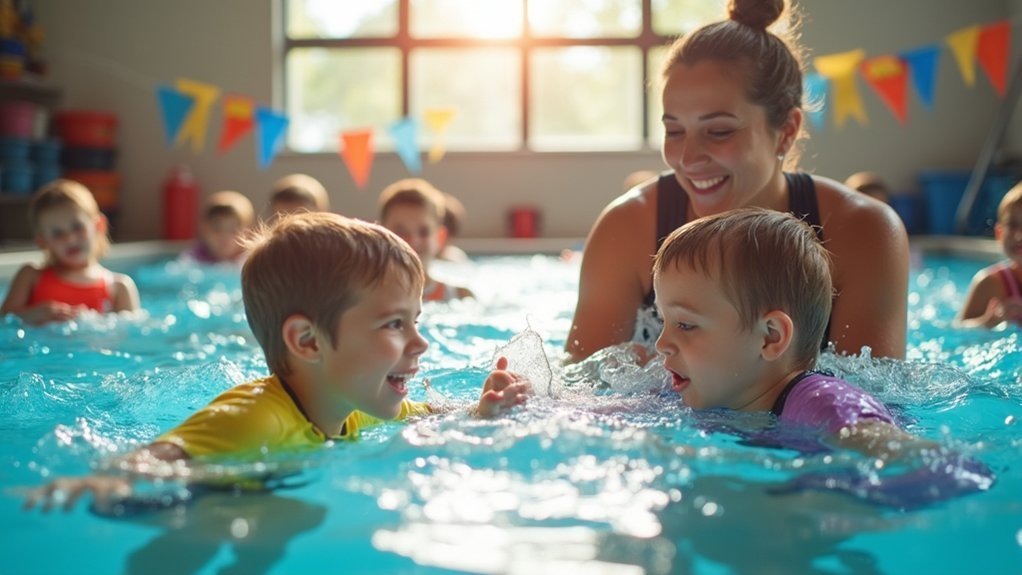

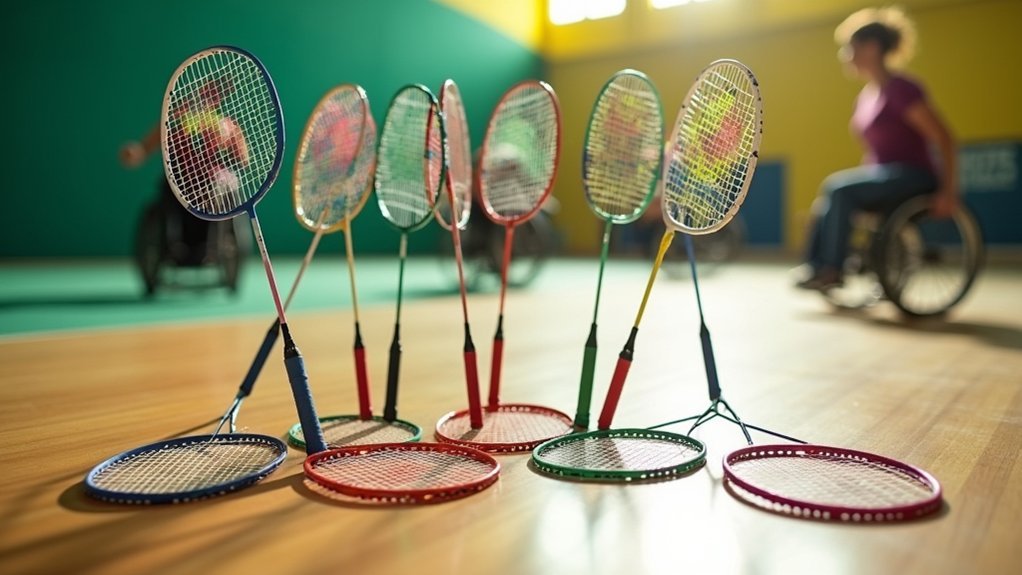

Leave a Reply